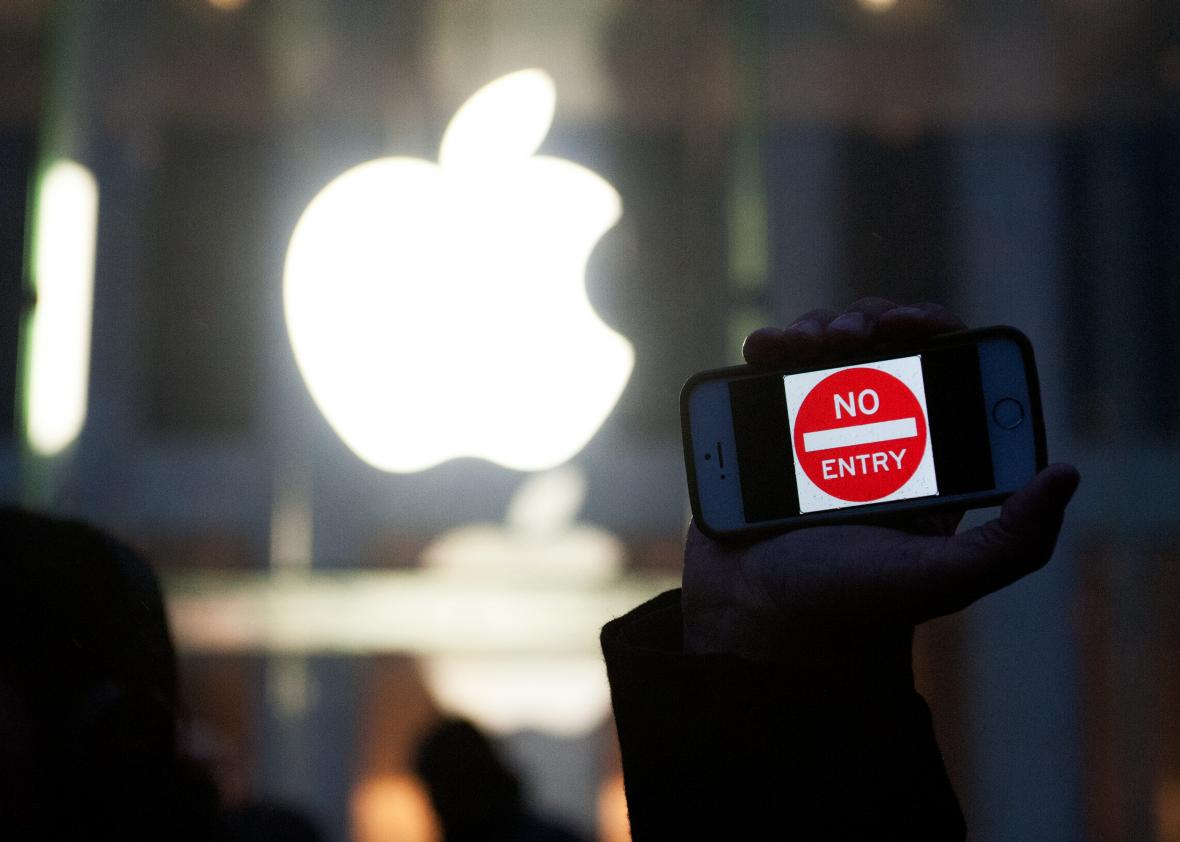Lessons From the Government’s 63 Prior Attempts to Make Tech Companies Unlock Devices

Bryan Thomas/Getty Images
The FBI’s public dispute with Apple, concerning whether Apple can be conscripted to help the FBI access data on locked iPhones, is on hold. After obtaining a court order requiring Apple to write software that would help the FBI get into the iPhone of San Bernardino shooter Syed Farook—an order that, if repeated by other courts, would threaten both the security of individual iPhone users and the entire system on which that security relies—the bureau has accessed the phone without Apple’s help. So the San Bernardino case will not be litigated, and it is tempting to look ahead to the next case on whether the FBI can force companies to break the security features on which their customers rely.
But to understand what might happen in that next case, it is vitally important to understand what has happened in prior cases.
Both the FBI and Apple have said that, beyond recent cases in San Bernardino and New York, the government has repeatedly invoked the same law—the 1789 All Writs Act—against technology companies. But these prior cases have not been clearly identified in recent court filings. So the national American Civil Liberties Union and the ACLU of Massachusetts (where I work) went looking for them. And we found dozens—more than 60—going back as far as 2008 and spanning more than 20 states.
These cases aren’t just artifacts. They contain profound lessons for the next time the government tries to conscript a tech company to unlock a cellphone—or hack users through a different platform, like a smart TV or a car.
First, they confirm that the next case won’t be about just one phone, because the government’s use of the All Writs Act has never been limited to just one phone. We found 50 orders directing Apple to unlock iOS devices. We found nine orders directing Google to unlock Android devices. We even found an All Writs Act order directing the disclosure of customer login information from a major bank. And the government did not suggest, in any of these cases, that it could compel assistance only in cases of mass shootings like the one in San Bernardino. In fact, the alleged crimes in these cases have ranged from drugs to counterfeiting.
The government has thus been using the All Writs Act as a jurisprudential Swiss Army knife, capable of forcing tech companies to pry open nearly any device in nearly any case. The question for the next case is whether, as it apparently tried to do in San Bernardino, the FBI will secure an appellate precedent ratifying this practice.
Second, the prior All Writs Act cases suggest that the next case might involve an even broader claim of government authority, because the government’s arguments have grown bolder over time. In prior cases, such as a Maryland case from 2014, the government accepted orders specifying that Apple would not be required to “enable law enforcement’s attempts to access any encrypted data.” But in the San Bernardino case, possibly in response to the wider use of encryption in iPhones, the government upped the ante; it acknowledged that it was seeking Apple’s assistance in “access[ing] the iPhone’s encrypted content.”
The government took this more aggressive stance even though it recently lost a bid to convince Congress to mandate encryption backdoors. So, having failed to persuade a 21st-century Congress to force companies to create a back door, the government told a court that an 18th-century Congress had already forced these companies to open the front door.
Third, these prior cases prove that, unless the next case is litigated openly, there is little hope of getting it right. Most of the prior orders were issued on the same day that the government sought them, with no objections filed by the tech companies. The results were predictably one-sided. Early on, in a 2008 court filing in New York, the government invoked the All Writs Act but conceded that there was “no specific statute” authorizing its request that Apple be ordered to unlock an iPhone. But by 2012, with multiple successes under its belt, the government asked the very same court to issue an All Writs Act order because “other courts” had done so.
The good news is that publicity has halted this momentum. Once recent cases in San Bernardino and New York were disclosed, courts began to hear not only from the government, but also from tech companies and civil liberties groups. Ordinary cellphone users also became empowered to voice their concerns to their mobile providers and their government. Consequently, the FBI is now facing unprecedented pushback from the public, tech companies, newspaper editors, and even high-ranking current and former intelligence officials.
It will now be much harder for the FBI to litigate these cases undetected. For example, it appears that the government has requested an All Writs Act order for an iPhone in a case pending in Massachusetts, and the ACLU of Massachusetts is prepared to challenge any undue sealing of docket sheets or filings related to that case. The FBI even lost a case: In February, a federal court in New York denied the FBI’s motion to require Apple to unlock an iPhone.
Of course, it remains to be seen which side will ultimately prevail. But the stakes are now clear.
These cases have never been about one phone. The FBI’s legal arguments are increasingly aggressive. And these cases should never be litigated outside public view.
Future Tense is a partnership of Slate, New America, and Arizona State University.
